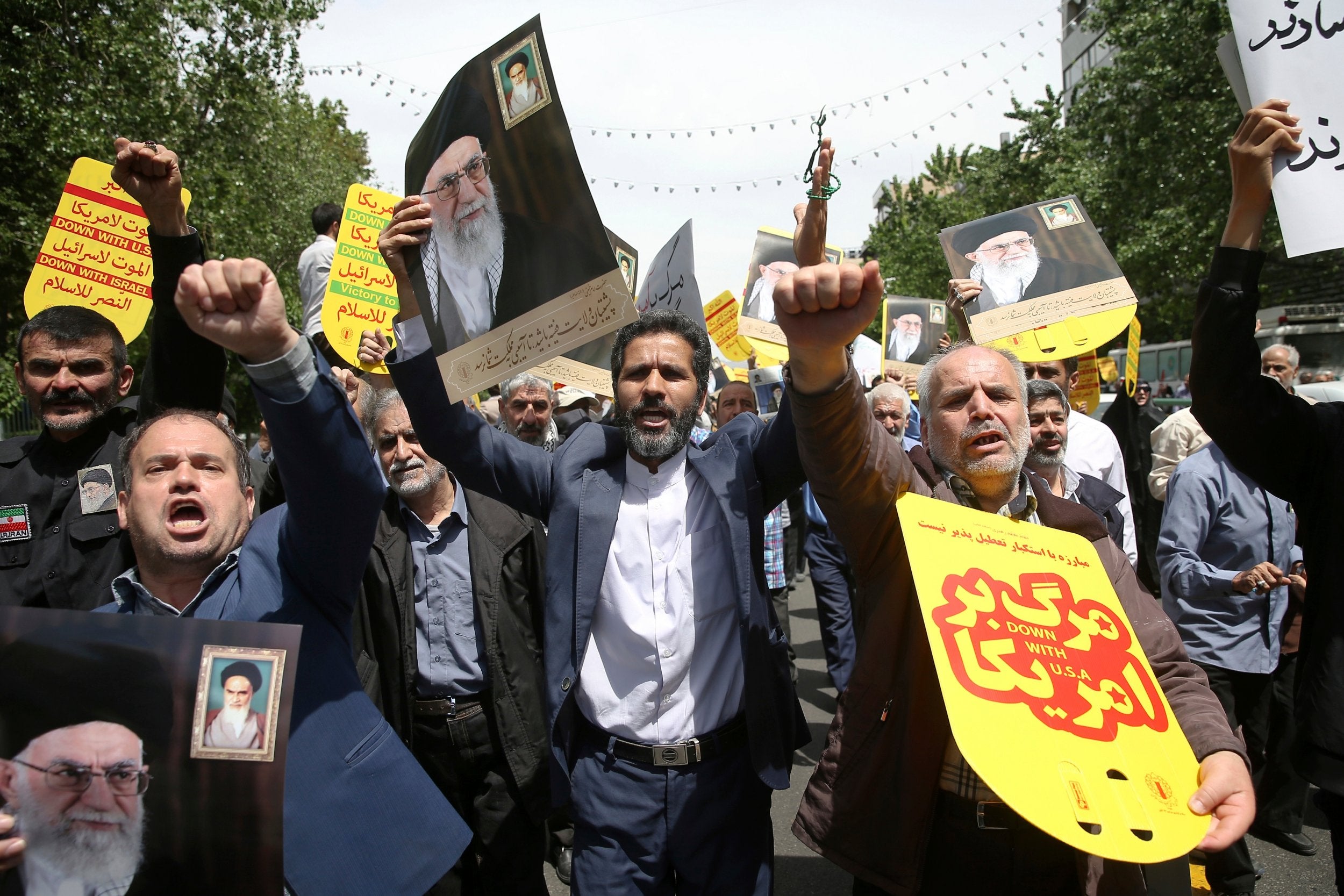Why Israel has been silent amid growing US-Iran tensions
Analysis: Now that Eurovision fans have flown home, there is nothing left to distract from the question of Iran and the spectre of a possible armed confrontation between Tehran, Israel’s biggest foe, and Washington, its closest ally, writes Bel Trew

Your support helps us to tell the story
From reproductive rights to climate change to Big Tech, The Independent is on the ground when the story is developing. Whether it's investigating the financials of Elon Musk's pro-Trump PAC or producing our latest documentary, 'The A Word', which shines a light on the American women fighting for reproductive rights, we know how important it is to parse out the facts from the messaging.
At such a critical moment in US history, we need reporters on the ground. Your donation allows us to keep sending journalists to speak to both sides of the story.
The Independent is trusted by Americans across the entire political spectrum. And unlike many other quality news outlets, we choose not to lock Americans out of our reporting and analysis with paywalls. We believe quality journalism should be available to everyone, paid for by those who can afford it.
Your support makes all the difference.Reports that Israeli missiles pounded targets near Damascus in Syria were literally drowned out by the singing and dancing of the Eurovision finals in Tel Aviv.
As usual, Israel did not openly acknowledge Saturday's strikes, which were reported by the Syrians and drifted under the news radar.
In the past, Israel has said it is targeting Iran’s attempts to build military infrastructure in Syria.
But now that Eurovision fans and contestants have flown home, there is nothing left to distract from the question of Iran and the spectre of a possible armed confrontation between Tehran, Israel’s biggest foe, and Washington, its closest ally.
And for Israel, which is being uncharacteristically quiet about the escalation, this is particularly tricky.
Despite being by far the loudest nation sounding the warning bells about the threat of Iran, there have been virtually no statements from the Israeli security apparatus, government or prime minister, since the US sent additional warships and planes to the Gulf, and Iranian nuclear officials signalled the country is poised to exceed internationally agreed caps on their nuclear stockpiles.
This is a stark 180-degree turn for Benjamin Netanyahu, who has staged a series of bombastic press conferences revealing Israeli intelligence on Iran’s nuclear inclinations (a lot of which, on closer scrutiny, was found to be old news).
But despite the bark and bluster, Israel does not want anyone to go to war with Iran, and it does not want to be blamed if a conflict does erupt.
Mr Netanyahu in particular, after being accused by some of encouraging the 2003 invasion of Iraq, is loath to be awarded this unhappy accolade once again.
Israel is arguably the one country at greatest risk from Iran and its many proxies, who surround the comparatively small nation and have openly called for its annihilation. To the north are militant group Hezbollah in Lebanon and Iranian forces in Syria, to the south are Iran-backed militants in Gaza.
The Iranian security apparatus has allegedly funnelled sophisticated weaponry to its allies Hezbollah, which according to Israeli military has an arsenal of 130,000 missiles, the vast majority of which are capable of reaching as far south as Haifa.
Israel also accuses Iranian forces of trying to build permanent structures within Syria, and supporting, even directing, militant groups in Gaza.
While the south of Israel is well prepared for the comparatively homemade rockets of the likes of Hamas's Qassem Brigades and Palestinian Islamic Jihad in the Strip, most northern Israeli homes would not be able to deal with the precision missiles.
Israel’s formidable Iron Dome defence system has proved it isn't capable of handling hundreds of projectiles fired at it in concentrated bursts.
Israel has David’s Sling, a military system that can deal with medium -range fire, and Arrow 2 and 3 for long-range ballistic missile threats, but they are incredibly expensive to use.
“There is every motive in the world for Israel to stay away from this, for Netanyahu to maintain quiet,” said Amos Harel, a leading defence analyst and journalist for Haaretz newspaper.
“Israel doesn’t want to be on the frontline,” he added.
Yaakov Amidror, Netanyahu’s national security adviser between 2011 and 2013, echoed the same point: “We don’t want to face war on three fronts,” the retired major-general told The Independent.
“That is why we are fighting again and again to prevent the Iranians from having these capabilities,” he added.
Instead, Mr Netanyahu’s constant proselytising about the Iranian threat was seen to be aimed at pushing the US to ditch the 2015 Iran deal, which Mr Trump did just a week after the prime minister's dramatic “Iran lied” press conference last April.
Israel hoped added sanctions on Iran would pressure it to enter a new and “good agreement”, according to Mr Amidror.
Others suggest Israel has a longer plan to force regime change in Iran from within – and does not intend to spark war.
For Mr Netanyahu, the escalating tensions between the US and Iran is terrible timing.
He has just over a week to cobble together a coalition government after securing a record fifth term in office in the April elections.
Last week, he faced a rare attack from within his Likud Party, when his chief rival Gideon Sa'ar accused him of damaging Israel through proposed new legislation that would weaken Israel’s Supreme Court. Sa'ar has also criticised the ceasefire with Gaza.
With a possible rebellion bubbling within his own ranks, Mr Netanyahu can’t afford to scupper partnerships with coalition parties by making divisive statements on Iran.
And so for now at least, Israel will likely keep quiet and wait for America’s next move.
Join our commenting forum
Join thought-provoking conversations, follow other Independent readers and see their replies
Comments